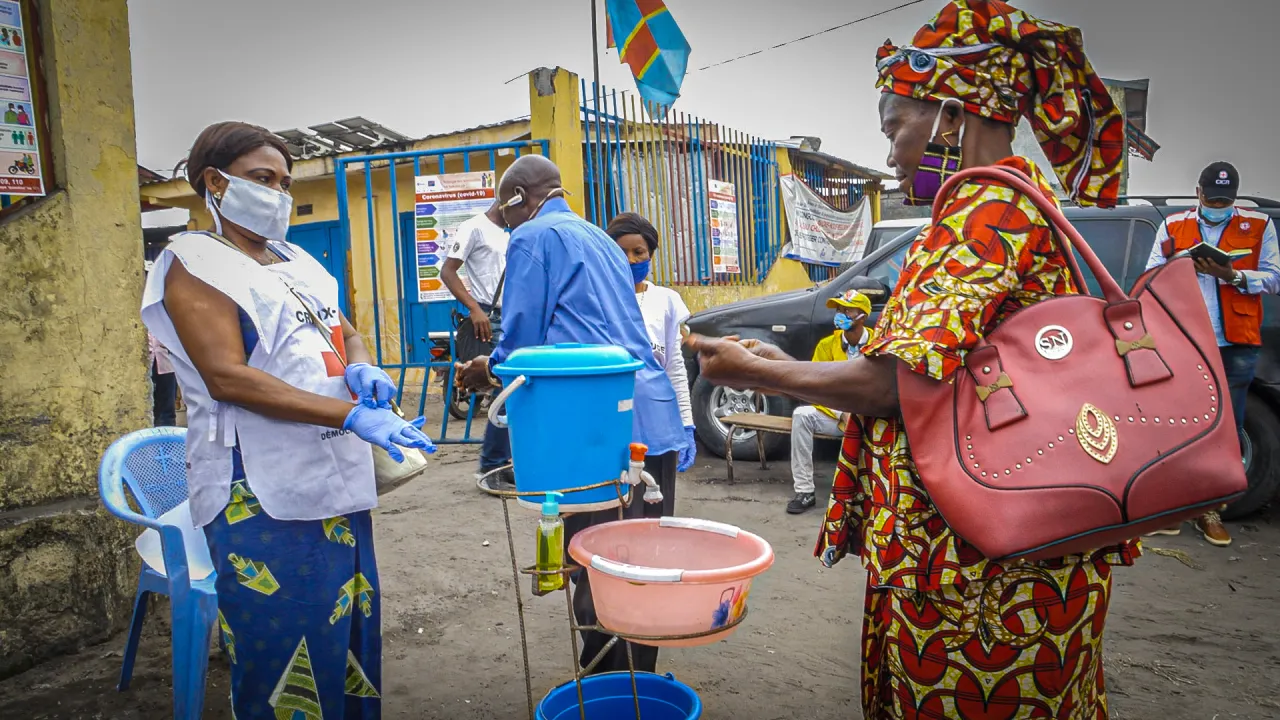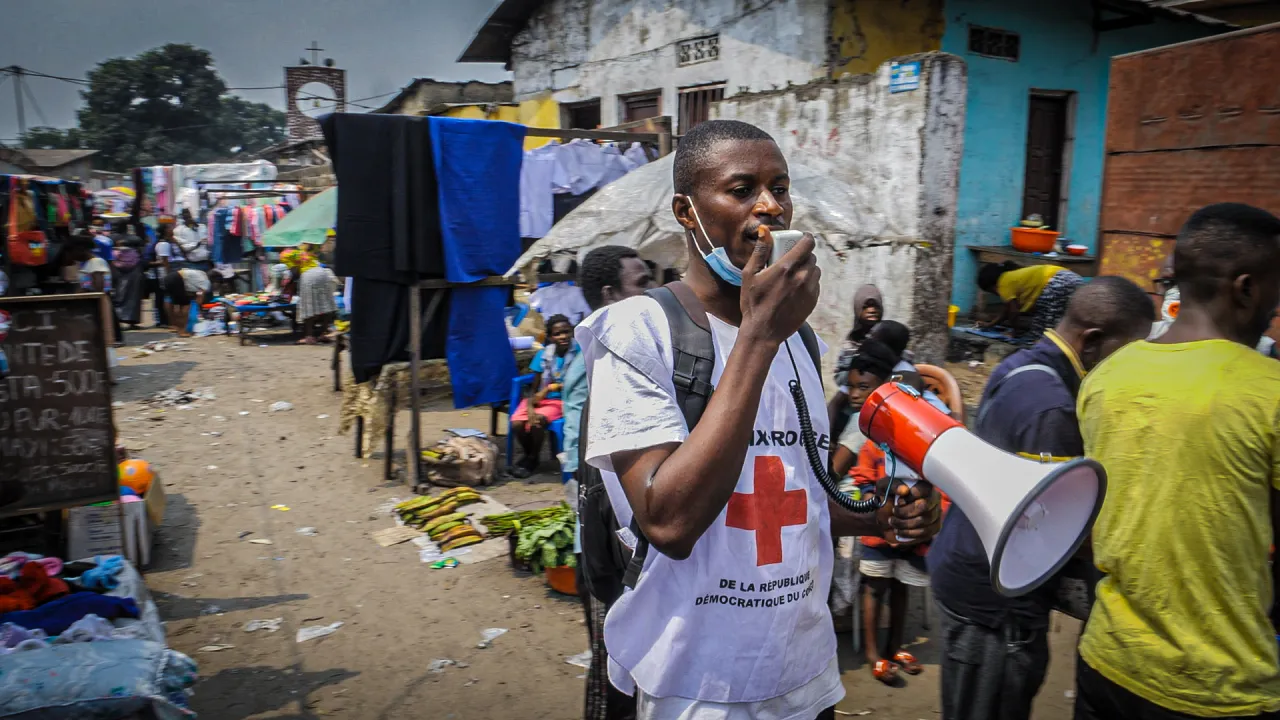Democratic Republic of the Congo: Rumours undermine fight against COVID-19 in Kinshasa

Many of the 13 million inhabitants of Kinshasa, capital of the Democratic Republic of the Congo, are ignoring guidance for preventing the spread of coronavirus. Red Cross volunteers are working hard across the city to raise awareness of the risks and precautions, but the task is proving challenging.
A team of Red Cross volunteers stands outside the local town hall in Makala, one of the 24 municipalities of Kinshasa. They remind locals to take precautions to prevent the spread of coronavirus, but their efforts are often in vain. "What have I eaten that means I should wash my hands?" taunts one young woman. "This disease is not my problem," says another passer-by. The handwashing station set up in front of the building has hardly been used, much like the infrared thermometer for checking people's temperature. The posters outlining preventive measures attract little attention, although they are hard to miss.
In Kinshasa, #DRC, Red Cross volunteers are often met with indifference or skepticism as to the existence of #COVID19.
Despite this, they are working hard to raise awareness of the risks and precautions.
The task, however, is proving challenging. pic.twitter.com/yXds8L5hjX— ICRC Africa (@ICRC_Africa) August 12, 2020
Out on the main street – a broad dirt road, with large puddles of water even in the dry season – there are crowds of people, yet few wear a mask. People stand chatting less than one metre apart. Nevertheless, Red Cross volunteer Kilola remains undeterred: megaphone in hand, he continues to tell people about the risk of COVID-19 and how to stay safe. "I'm not discouraged," he says. "They will eventually realize the danger they are in." He thinks that this carelessness stems from certain beliefs and urban legends, which are especially widespread among young people. "Many still believe that drinking locally produced alcohol will protect them from COVID-19."

Some people are following the guidance, while others are resistant. Photo: Jonathan Busasi Nsalimbi / ICRC
Kinshasa at the epicentre of the pandemic – and the rumours
At the start of the pandemic, markets in Kinshasa stocked huge quantities of a plant called kongo bololo, as its bitter leaves were rumoured to cure coronavirus disease. "This kind of hearsay really sets us back," says Kitumua, who supervises the team of Red Cross volunteers.
With all these myths going around, we're sometimes treated like crooks or accomplices.
Kinshasa is the worst affected part of the Democratic Republic of the Congo. "The pandemic is not over yet," says Kitumua. "People followed the guidance quite closely at the start, but now seem to have become more lax." Volunteers are stationed at various hotspots across the city – major crossroads, main roads and local markets, where people tend to gather without precautions.
The Rond-Point Ngaba market to the south of the city is one such place. Traders and customers here come into such close contact every day that the risk of transmission is high. The narrow passageways between stalls are bustling and people are pushing past each other at times.

Red Cross volunteers are often met with indifference or scepticism as to the existence of the virus. Photo: Jonathan Busasi Nsalimbi / ICRC
"Show us someone who's sick with COVID-19 and then we'll believe you," retorts a market seller, when approached by Red Cross volunteers.
"It's tough talking to someone who disputes everything you're saying," admits Kitumua. "We're doing our best to listen to their concerns. We also reassure them that these measures are not an imposition but rather for their own and others' safety."
Here, too, there is a general lack of concern about risk, and mask-wearing is the exception rather than the rule. Many people remain sceptical that the virus even exists.
The Red Cross handwashing station is used by some, but water shortages are a recurring problem. "Every day, we buy water from a borehole around 200 metres from here," says Kilola. Twenty-five litres of water costs 200 Congolese francs. The vast majority of people in Kinshasa live on less than 2,000 Congolese francs (1 euro) a day.
Going from door to door
Given the resistance to public awareness-raising efforts, Kitumua has suggested that her volunteers go from door to door to spread the message.
"We've got to be creative," she says. "We've also been trained to work in this way at the Red Cross, passing on information by word of mouth." She thinks that having private conversations with people on their doorsteps may be more effective than raising awareness on the streets. "People are more likely to listen and take on board the hygiene recommendations, and less likely to be swayed by those who contest what we're saying."
Over 7,500 cases of COVID-19 have been recorded in Kinshasa to date. Though the state of emergency was lifted on 21 July, to help revive the economy, new cases are being recorded every day. The authorities have introduced restrictions to increase compliance with preventive measures, such as fines for not wearing a mask in public places. Awareness-raising work continues and vigilance remains of the essence.
The International Committee of the Red Cross has been supporting the efforts of the Red Cross Society of the Democratic Republic of the Congo to prevent the spread of COVID-19 since the start of the pandemic: training up volunteers across the country, supplying handwashing stations and awareness-raising materials, and managing the dead. We also cover volunteer expenses and help produce awareness-raising campaigns for the radio and the press.



